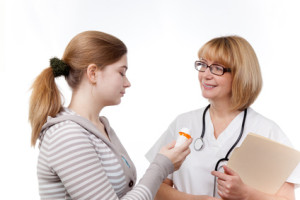- Calls to this hotline are currently being directed to Within Health, Fay or Eating Disorder Solutions
- Representatives are standing by 24/7 to help answer your questions
- All calls are confidential and HIPAA compliant
- There is no obligation or cost to call
- Eating Disorder Hope does not receive any commissions or fees dependent upon which provider you select
- Additional treatment providers are located on our directory or samhsa.gov
Assisting Physicians in Eating Disorder Prevention

Contributor: Stephanie Sands, BSc, writer for Eating Disorder Hope and Addiction Hope
Health promotion is a relatively new aspect of health care, and involves preventing diseases before they start. Community-wide interventions focused on improving health and preventing disease include things like holding vaccine clinics at local schools, or banning smoking in public areas. Huge strides in the last century have been made with respect to improving physical health, but less attention has been given to mental health.
However, mental health and physical health go hand in hand- as mental health improves, physical health generally does too. Improvements in physical health and well-being through mental health promotion could be considered the medical equivalent of a “two-for-one” deal! [1, 2]
Movement away from the traditional ‘medical model’ of disease treatment toward a ‘biopsychosocial’ one helps physicians in treating disease by acknowledging not only the biological precursors of disease, but the psychological and social ones too. [2] While it may be well-known now that smoking causes cancer, and a high-fat diet leads to cardiovascular disease, it is difficult to pinpoint the tangible causes of mental health problems like eating disorders (ED).
Community-wide mental health interventions are just as important as those designed for physical health improvement. Research shows that school-based eating disorder prevention programs for adolescent girls have lead to significant decreases in eating disorder risk factors like body dissatisfaction and thin ideation.
Benefits of a Balanced Diet
 Prevention programs also help decrease the risk of unhealthy behaviors like dietary restriction, binge eating and purging. Teaching middle school students the benefits of a balanced diet and exercise provides a trickle-down effect with respect to reducing the risk of ED development, while also improving physical health, self-esteem, and self-efficacy. [3, 4, 5]
Prevention programs also help decrease the risk of unhealthy behaviors like dietary restriction, binge eating and purging. Teaching middle school students the benefits of a balanced diet and exercise provides a trickle-down effect with respect to reducing the risk of ED development, while also improving physical health, self-esteem, and self-efficacy. [3, 4, 5]
As healthcare professionals, doctors should be aware of the medical complications related to eating disorders, such as heart problems, osteoporosis, organ damage, electrolyte imbalance, low blood pressure, and infertility. Even with treatment, individuals with past eating disorders may experience ill-health many years later.
Knowledge of mortality rates is also important; anorexia is the leading cause of mortality related to mental illness in young women, with suicide typically being the cause of death. Prevention and treatment within the early stages of ED development can not only save lives, but also reduce future health care utilization and medical costs related to eating disorders. [6]
The Physician’s Role in Mental Health Promotion
Family doctors are often the first point of contact for the treatment of eating disorders, but can they be helpful in preventing them as well? General practitioners may not be as knowledgeable with respect to mental health conditions, but they will be able to provide resources and referrals to counsellors.
 Awareness of the signs and symptoms of eating disorders can help physicians identify eating disorders in patients before they require intensive treatment. If a doctor suspects an eating disorder in a patient, they may serve as a care coordinator by ordering tests like blood work to examine electrolyte levels or by administering and eating disorder screen like the Eating Disorders Examination Questionnaire (EDE-Q). [3, 6]
Awareness of the signs and symptoms of eating disorders can help physicians identify eating disorders in patients before they require intensive treatment. If a doctor suspects an eating disorder in a patient, they may serve as a care coordinator by ordering tests like blood work to examine electrolyte levels or by administering and eating disorder screen like the Eating Disorders Examination Questionnaire (EDE-Q). [3, 6]
Eating disorders are not always easy to detect, so screening for eating disorders can be useful for patients presenting with symptoms like persistent heartburn, sore throat, bloating, constipation, and abdominal pain. While these symptoms could be indicative of digestive illness, they are also side effects of purging. [6]
Additionally, patients who display some signs of eating disorder pathology without meeting the full criteria for an eating disorder should be screened; for example, a healthy-weight female expressing concern about weight gain as a side effect of medication, and also mentions not having a menstrual period for 6 months should be tested for more than just the possibility of pregnancy.
If the physician determines that the patient is at particular risk of having or developing an eating disorder, then it is important for a follow-up session to discuss test results in detail. This type of session may take place privately with the patient, or parents if the patient is underage.
 If an ED diagnosis is suspected, the doctor may give a battery of questionnaires after obtaining a detailed history of the patient’s mental health status to uncover potential triggers contributing to ED development. From here, the doctor may provide a referral to an eating disorder treatment program or prescribe anti-depressant medication if appropriate.*
If an ED diagnosis is suspected, the doctor may give a battery of questionnaires after obtaining a detailed history of the patient’s mental health status to uncover potential triggers contributing to ED development. From here, the doctor may provide a referral to an eating disorder treatment program or prescribe anti-depressant medication if appropriate.*
Goals of the family physician in addressing eating disorders with a patient may also include starting conversations about the patient’s eating habits and assessing their level of motivation to change unhealthy habits. [6]
Even if the doctor suspects an eating disorder, the patient may not be ready to change their habits, so it is important that the doctor determines the patient’s perspective of the problem before suggesting treatment.
Relapse Prevention and Harm Reduction
 It may not always be possible for doctors to prevent eating disorders before they start, but an important role of the physician in eating disorder treatment is medical supervision before, during, and after ED-specific treatment. Monitoring things like weight gain or loss, electrolyte balance, and possibility of additional mental health problems like depression or substance use are important once an eating disorder diagnosis has been given.
It may not always be possible for doctors to prevent eating disorders before they start, but an important role of the physician in eating disorder treatment is medical supervision before, during, and after ED-specific treatment. Monitoring things like weight gain or loss, electrolyte balance, and possibility of additional mental health problems like depression or substance use are important once an eating disorder diagnosis has been given.
Ensuring that the patient is staying on track with their treatment reduces the risk of adverse outcomes such as refeeding syndrome in underweight patients, or relapse into ED behaviors. Doctors may also provide helpful tips for harm reduction, such as rinsing with baking soda to neutralize the damage from stomach acid on dental enamel if the patient is purging through vomiting. If medication has been prescribed, a physician can also monitor the effects of the medication and provide refills when necessary.
Be Your Own Advocate
 Physicians aim to provide the best care for their patients, but they may not always be able to detect a mental health problem in its early stages. If you are concerned about your own eating habits, or those of a friend or family, bring it up with your doctor. They should be willing to address your concerns and provide additional resources about eating disorders.
Physicians aim to provide the best care for their patients, but they may not always be able to detect a mental health problem in its early stages. If you are concerned about your own eating habits, or those of a friend or family, bring it up with your doctor. They should be willing to address your concerns and provide additional resources about eating disorders.
*The anti-depressant medication Prozac is regularly used for the treatment of bulimia nervosa. New research suggests that the stimulant medication Vyvanse has shown success in treating binge eating disorder, while pharmaceutical treatment may not be useful in the treatment of anorexia nervosa.
Community Discussion – Share your thoughts here!
At what stages of treatment and recovery have you found advocacy to be most important?
About the Author: Stephanie Sands is currently pursuing a Bachelor of Science degree in Kinesiology, majoring in Mind Sciences. She completed an Honors Degree in Psychology in 2012, focusing on eating disorders and personality. She intends to combine her educational background into a holistic wellness practice, to strengthen mental health through a combination of counselling, physical activity, and nutrition coaching.
References:
[1]: World Health Organization. (2004). Promoting mental health: Concepts, emerging evidence, practice. World Health Organization, Geneva.[2]: Butler-Jones, D. (2009). A reflection on public health in Canada: Applying lessons learned for the next century of public health practitioners. Canadian Journal of Public Health, 100(3), 165-166.[3]: Carter, C. J., Stewart, D. A., Dunn, V. J., & Fairburn, C. G. (1997). Primary prevention of eating disorders: Might it do more harm than good? International Journal of Eating Disorders, 22: 167-172.
[4]: Stice, E., Shaw, H., & Marti, C. N. (2007). A meta-analytic review of eating disorder prevention programs: Encouraging findings. Annual Review of Clinical Psychology, 3: 207-231.
[5]: Stice, E., Shaw, H., Burton E., & Wade, E. (2006). Dissonance and healthy weight eating disorder prevention programs: A randomized efficacy trial. Journal of Consulting and Clinical Psychology, 74(2): 263-275.
[6]: Williams, P. M., Goodie, J. L. & Motsinger, C. D. (2008). Treating eating disorders in primary care. American Family Physician, 77(2), 187-195. www.aafp.org/afp
The opinions and views of our guest contributors are shared to provide a broad perspective of eating disorders. These are not necessarily the views of Eating Disorder Hope, but an effort to offer discussion of various issues by different concerned individuals.
We at Eating Disorder Hope understand that eating disorders result from a combination of environmental and genetic factors. If you or a loved one are suffering from an eating disorder, please know that there is hope for you, and seek immediate professional help.
Last Updated & Reviewed By: Jacquelyn Ekern, MS, LPC on April 13, 2016
Published on EatingDisorderHope.com

The EatingDisorderHope.com editorial team comprises experienced writers, editors, and medical reviewers specializing in eating disorders, treatment, and mental and behavioral health.

